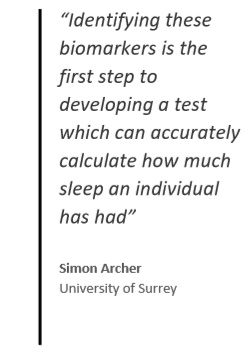
Researchers have developed a new test which could pave the way for police forces to identify whether a driver involved in a collision was suffering from sleep deprivation.
Scientists from the Sleep Research Centre at the University of Surrey have created a blood test capable of telling whether a person has skipped a night’s sleep.
The researchers say the breakthrough, which could also ‘assist employers in assessing fitness for duty’, paves the way for a future test to accurately calculate how much sleep an individual has had.
Led by professor Derk-Jan Dijk, tests carried out on 36 participants who’d gone through a 40-hour period of sleep deprivation identified changes in the ‘expression levels’ of thousands of genes.
 A machine learning algorithm identified a subset of 68 genes and, with 92% accuracy, could detect whether a sample was from a ‘sleep-deprived’ or ‘well-rested’ individual.
A machine learning algorithm identified a subset of 68 genes and, with 92% accuracy, could detect whether a sample was from a ‘sleep-deprived’ or ‘well-rested’ individual.
Dr Emma Laing, senior lecturer in bioinformatics at the University of Surrey, said: “We all know that insufficient sleep poses a significant risk to our physical and mental health, particularly over a period of time.
“However, it is difficult to independently assess how much sleep a person has had, making it difficult for the police to know if drivers were fit to drive, or for employers to know if staff are fit for work.”
Simon Archer, professor of molecular biology of sleep at the University of Surrey, said: “Identifying these biomarkers is the first step to developing a test which can accurately calculate how much sleep an individual has had.
“The very existence of such biomarkers in the blood after only a period of 24-hour wakefulness shows the physiological impact a lack of sleep can have on our body.”
Professor Derk-Jan Dijk, director of the Sleep Research Centre at the University of Surrey, said: “This is a test for acute total sleep loss; the next step is to identify biomarkers for chronic insufficient sleep, which we know to be associated with adverse health outcomes.”
Previous research in this area from the AAA Foundation for Traffic Safety has shown that drivers who get just one to two hours less than the recommended daily allowance in a 24-hour period nearly double their risk of being involved in a collision.
Would it also be possible or practical to ask a driver to give a voluntary breath test at the same time. In order to prove that he was not intoxicated by the taking of alcohol the night before. I have seen many vehicles swaying all over the roads at times during the day and presumed the driver to be drowsy but it could also be that they are still drunk.
R.Craven
0